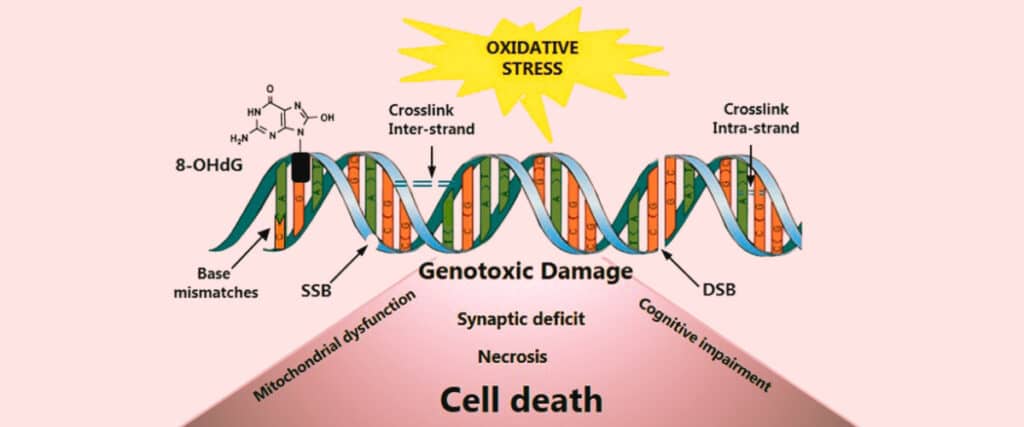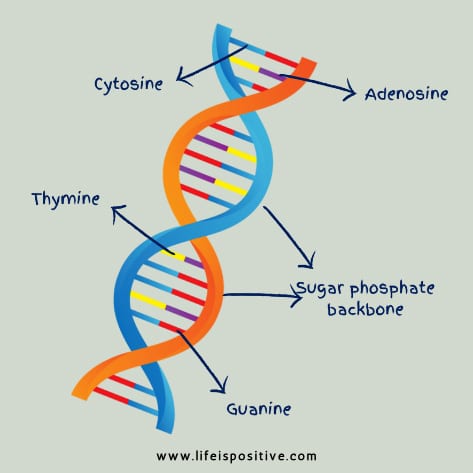|
Getting your Trinity Audio player ready...
|
Ever feel like stress is messing with you on a whole new level? You’re not wrong! Science suggests that chronic stress might actually change your DNA, affecting everything from aging to disease risk.
Yes, stress isn’t just in your head—it could be written into your genetic code! But how does this work? And is it permanent? The idea that stress can change your DNA sounds like it is unreal, but research shows it’s very real.
Let’s dive into the fascinating world of epigenetics and uncover how stress could be rewriting your body’s story.
Understanding DNA
DNA is like your body’s ultimate instruction manual, coiled up in every cell’s nucleus like a genetic double helix spiral staircase.
It’s made up of four chemical bases—adenine (A), cytosine (C), guanine (G), and thymine (T)—kind of like the letters in a genetic alphabet.
With about 3 billion of these bases, it’s no wonder we’re all a bit of a genetic jumble, yet 99% of our DNA is pretty much the same across the board.
Now, onto genes. Genes provide the blueprints to make proteins, the essential building blocks of our bodies. The process of turning DNA’s instructions into these protein masterpieces is called gene expression.
But here’s the kicker: this process isn’t just a set-it-and-forget-it deal. Your surroundings and even stress can sway it.
Enter epigenetics—the study of how your environment and lifestyle can switch your genes on and off like a genetic light switch. So, next time you’re stressed, remember your DNA might just be getting a makeover!
The Nature of Stress
Stress is like your body’s over-the-top reaction to anything that shakes up your world, whether it’s a real threat or just a perceived one. It comes in two flavors: acute and chronic.
Acute stress is your short-term, adrenaline-pumping reaction to things like speaking in public or taking a big test.
Chronic stress, however, is the long-haul drama that comes from ongoing hassles like money troubles or a never-ending work grind.
Read: 10 Importance of Vitamins for Your Health
When stress hits, your body goes into full-on action mode. The hypothalamus, a tiny brain region that’s basically your body’s emergency coordinator, kicks off a high-alert system.
It sends a flurry of signals to the adrenal glands, perched on top of your kidneys, telling them to release a blast of hormones like adrenaline and cortisol.
This hormonal rush gets you primed for either fighting or fleeing, turning you into a human stress machine.

Mechanisms of Stress-Induced DNA Changes
Epigenetics is like the VIP backstage pass to understanding how stress messes with your DNA’s behavior without actually changing the genetic code itself.
Here’s a quick rundown of the three main players in this show:
1. DNA Methylation: Think of this as adding a “do not disturb” sign to your DNA. A methyl group tags onto DNA, especially at cytosine bases, which can put a damper on gene activity without touching the actual sequence. High methylation levels usually mean the genes are on vacation.
2. Histone Modification: Histones are the proteins that DNA wraps around like a cozy blanket. When these proteins get a makeover, they can either tighten up or loosen the DNA. Adding acetyl groups to histones is like giving DNA a spa day, which often boosts gene expression.
3. Non-coding RNA: These RNA molecules are the unsung heroes of gene regulation. They don’t code for proteins but can still influence gene expression. Stress can mess with these non-coding RNAs, leading to a shake-up in how certain genes are turned on or off.
So, when stress hits, these mechanisms go into overdrive, tweaking gene expression and potentially causing all sorts of health hiccups.
Scientific Evidence
Turns out, stress doesn’t just give you a bad day—it can actually tweak your DNA! Research has found that stress can mess with the epigenetics of both animals and humans.
For instance, studies on rodents reveal that a mom’s stress level can change her babies’ stress responses, thanks to some DNA methylation tweaks.
In humans, childhood trauma has been linked to different DNA methylation patterns compared to those who had a more carefree start.
Read: Top 5 Foods That Help With Depression And Stress
One eye-opening study discovered that parents caring for chronically ill kids had shorter telomeres compared to a control group.
Telomeres are like the protective caps on your chromosomes, and when they shrink, it’s a sign of accelerated aging.
Shorter telomeres are associated with a higher risk of age-related diseases, meaning chronic stress might just fast-track you to an older biological age.
Stress: it’s not just in your head, it’s in your genes too!
Health Implications
Stress doesn’t just mess with your mood; it can also stir up a storm in your DNA, leading to all sorts of health issues.
When stress changes how your genes are expressed, it’s been linked to mental health problems like depression and anxiety.
Plus, it can throw your immune system off balance, making you more prone to catching everything from the common cold to more serious infections.
Chronic stress is also like adding fuel to the fire of inflammation, which can ramp up your risk for chronic diseases such as heart disease and diabetes.
And if that wasn’t enough, these stress-induced genetic changes might even play a part in cancer by messing with the genes that control cell growth and the natural cell death process.
So yeah, stress is basically the gift that keeps on giving—and not in a good way!
Read: 10 Weird Negative Effects of Social Media on Your Brain
Mitigating the Effects of Stress
Sure, stress can mess with your DNA like a bad hair day messes with your mood, but don’t worry—there are ways to hit the reset button.
Tackling stress with mindfulness, meditation, and a good sweat session at the gym can help keep its effects in check.

Types of DNA damage due to oxidative stress
And let’s not forget the basics: a balanced diet and solid sleep are like your DNA’s best friends when it comes to stress management.
The good news? Some of the stress-induced genetic changes aren’t set in stone. Research has shown that adopting a healthy lifestyle and hitting the gym can actually reverse those pesky DNA methylation patterns.
So, it’s definitely worth the effort to keep stress—and its impact—under control. Your DNA will thank you!
Final Thoughts: How Stress Changes Your DNA
Stress might be a constant companion, but it doesn’t have to turn your DNA into a disaster zone.
Knowing how stress messes with your genetic code and learning how to handle it can be a game-changer for your health and happiness.
You can tackle stress head-on with some straightforward changes. Start by weaving mindfulness practices into your day, like meditation or deep breathing. Add regular exercise to your routine to boost those mood-enhancing endorphins.
Even simple things, like indulging in a hobby or ensuring you get enough sleep, can make a big impact. So, give yourself a break, take control of your stress, and make these positive shifts.
Your DNA—and your overall well-being—will be grateful.
For more empowering content, connect with our vibrant community here ➡️ Social Media.


